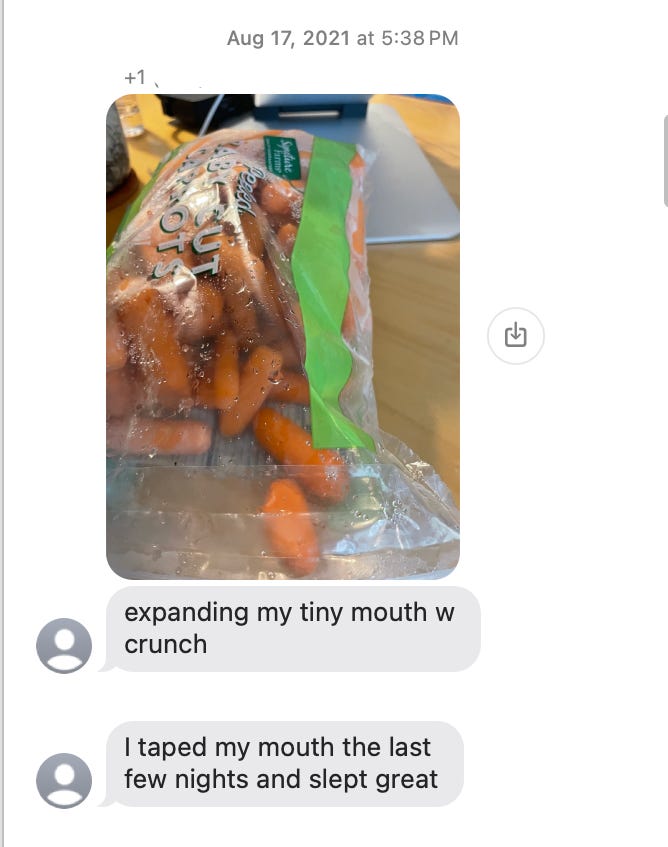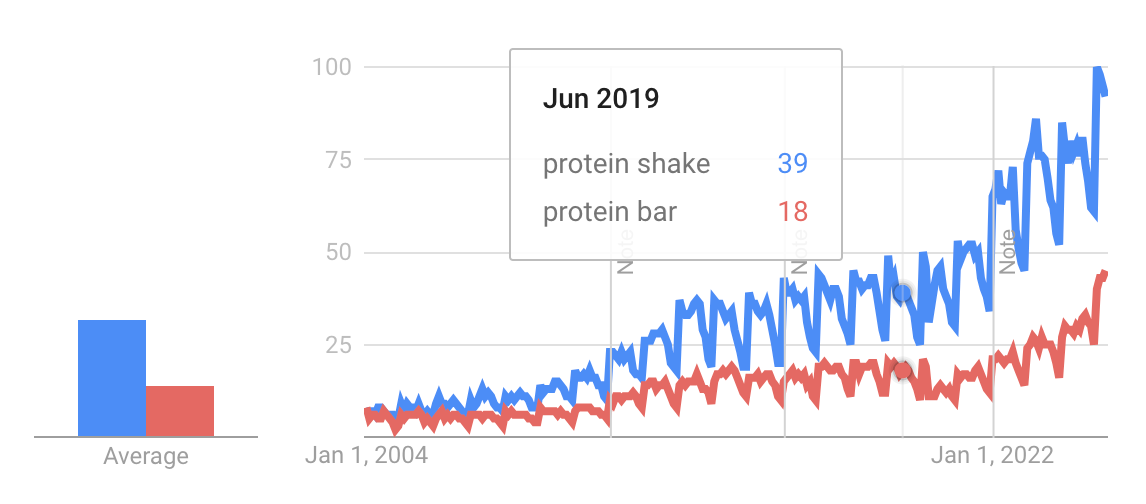$40M mouth tape and the best email I've ever gotten
On being early and thinking you're too late
Welcome to the 16% of you who are new, and thanks for being here! If you’re interested in business, you may enjoy reading about my relationship with Chopt & Sweetgreen, what fancy hotels are selling , or Blank Street Coffee. If you’re not, you might like reading about the most powerful book clubs or Dimes Squares’ troubling traffic patterns or what rich New Yorkers name their dogs. And feel free to respond to this email & introduce yourself!
Of the 186,658 emails in my Gmail account, there is a single one that I have returned to years after receiving it, just for the pleasure of reading it again.
My grandfather (and Residual Thoughts Reader Emeritus) sent it to me at precisely 5:00 p.m. on January 31st, 2018. It was a response to my having breathlessly recommended him the book Why We Sleep by Matthew Walker. I had just read the book and was blown away by the devastating impact that inadequate sleep has on one’s health (did you know the rate of heart attacks spikes the Monday after Daylight Saving time robs us of an hour of sleep?!)
His email begins with a compliment for the book:
He then politely and methodically eviscerates Walker’s pop non-fiction sloppiness (emphasis mine):
I have a few quibbles. For example, he repeatedly refers to MRI (magnetic resonance imaging) rather than fMRI (functional magnetic resonance imaging), even though the studies he refers to could not be done with MRI, only with fMRI.
He makes absolute statements, such as the brain being 'completely devoid' of noradrenaline during REM sleep, only to modify them, such as saying that noradrenaline is at a 'low' level.
He is outright wrong when he talks about the dangers of venous hypertension when it is arterial hypertension that is the problem.
For me, it was off-putting to quote Aristotle in Latin: either use the original Greek or only the English translation rather than quote an intermediate translation, as if Aristotle wrote in Latin.
I was particularly impressed by my grandpa’s critiques 2 years later, after this blog post credibly accusing Walker of fabricating sources in the book went viral1.
The “Aristotle in Latin” bit is my favorite; this is of course not something I had noticed when I read the book but is such an incredible dunk, and now completely fits my conception of Walker as an overly ambitious young professor who Demands to be Taken Seriously and seems to have heavily monetized his ascendancy to public intellectual.

Nevertheless, I cared a lot about my Sleep Score
Of course, irrespective of my grandpa’s excellent critiques, the book did convince me to take sleep a lot more seriously as something that could make me happier and healthier. In 2021, I got a fitbit and discovered the Huberman Lab podcast, both of which had the predictable effects of improving my sleep and making me more annoying to be around.
That summer, two friends and I drove to Michigan and listened to Breath, by James Nestor, which I’d been turned on to by the below tweet.
I’d had the same experience Patrick had with Born to Run (those of you who spent two months jogging barefoot in 2010 will understand) and I knew nothing about about breath as a lever for health. I trust Patrick’s taste so I gave it a try.
The book’s thesis is that
How you breathe has a huge impact on the way you feel
Breathing through your mouth is terrible for you, and modern diets2 full of soft, processed food have changed the shape of our moths, making it much harder to “nose-breathe”
Getting yourself to nose-breathe, particularly at night, will improve your sleep, your health, and even your appearance
I was marginally older and wiser than I was when I read Why We Sleep, but still, “a book with a simple reason you’re not living up to your potential” is catnip for me, and it was the perfect nonfiction book for a road trip. It gave us entertaining stories, some new, dubiously researched protocols to experiment with, and plenty of funny things to reference as we drove across the midwest.
The focus on breath has proven helpful for me, mainly in how immediately impactful I’ve found breathwork to be; I’ve been surprised to learn that a 6 minute breathing exercise can have as big an effect on how I feel as a mezcal negroni.
But the most surprising technique the book introduced me to was taping your mouth shut while you sleep. This has all the makings of a viral activity: it feels ridiculous enough to be noteworthy; it’s cheap and easy to do; and you can tell quickly if it is working. I’ve tried it on and off since reading the book, and I do think it improves the quality of my sleep (although not enough for me to do it consistently).
I distinctly remember thinking when I learned of this back in 2021 that it would be a good business to brand some surgical tape as “mouth tape for sleeping,” give it a nice website and a healthy markup, and sell it to excited people who’d just read the same book I had. But I figured I was probably already too late; the book had been out for more than a year, and a quick google search produced a couple of brands already doing this.
I was entirely wrong. Interest in the category has exploded in the past 4 years:

It had felt to me in 2021 like the insight that mouth tape could be a trendy product would already be “priced in” and too competitive to make much money in. The explosive trajectory of Hostage Tape shows just how off this was. The brand was founded in 2022, and apparently grew from $900k in its first year to $14M in 2023 to ~$40M in 2024. That’s a lotta tape!
I hadn’t know about any of this until a few weeks ago. If I’d have given it any thought, I would’ve said that the market for mouth tape was mostly still “guys who talk to you about their Oura ring” and would face very real headwinds like this one:
That is, until I chanced upon
’s substack Sleep or Die diaries, which chronicles her building of a company in the sleep space whose first product was Sleep Tape.
It turns out that mouth taping during sleep has blown up on TikTok and Instagram and has a much broader market than I’d realized or expected when I’d learned about it in 2021. Another big brand targeting women markets the product with beauty benefits:
“Enhance your nighttime rituals and energize your mornings with a more sculpted jawline, brighter eyes, way more energy and a touch of pink. The Skinny Confidential Mouth Tape is here to give you beauty benefits while in the deepest sleep of your life.”
It’s easy to feel like something has “peaked”
So, I was wildly wrong in 2021 about where we were in the mouth tape trend cycle, and how big it would get. I’ve found that it’s easy to think you’re too late to something and this is often a mistake. This mistake is getting easier to make because media is getting more and more personalized. As echo chambers get tighter, it’s easier to feel like everyone in your bubble is doing something without realizing just how small your bubble is.
Examples abound. In 2020 it felt like everyone in tech was starting a substack and that the platform was becoming too noisy to find an audience. Of course, 2020 turned out to be early in substack’s growth trajectory, and the platform has grown enormously in the past year:
I remember thinking when I was working at a consumer VC in 2019 that protein was fully mature as a consumer trend; I had seen Chobani sweep through my college’s dining hall in 2013 and it felt like the Tim Ferriss types had been pushing the benefits of a high-protein diet for years. I figured the wave had crested. As it turns out, protein just kept growing as a consumer trend:
How do you mitigate this, if you want to understand reality better? I think that being intentional about talking to people and reading things outside of your socioeconomic and algorithmic bubbles is increasingly important as the world becomes more personalized. If you have examples of this I’d love hear em!
Thanks for reading. In other news, I just finished Midnight in the Garden of Good and Evil, which made exploring Savannah much more fun. Statistically, at least 1 of you is going to a bachelor/ette party there in May; email me and I’ll mail you my copy!
Unfortunately several authors of my favorite nonfiction books seem to have taken a Faustian bargain in fabricating evidence for their claims; Dan Ariely’s book Predictably Irrational led me to major in economics and he’s since been credibly accused of falsifying data. This has been a major driver of my pivot to fiction.
In contrast to our prehistoric ancestors who had to chew lots of raw food, expanding their palates, and making them happy, muscular nose-breathing machines with perfect teeth. This book, like many other pop health books, paints pre-modernity humans as a model of health, which I have to imagine is quite inaccurate but is a tidy narrative.










Your grandpa's Latin dig had me absolutely shook. I would love to hear about other books he's absolutely torn apart. More grandpa commentary please.
Ha! I just happened to find some Hostage tape I thought I’d lost from when I bought it a couple years ago. I’m going to use it again tonight 🤣
Ps. Your Grandpa is a G